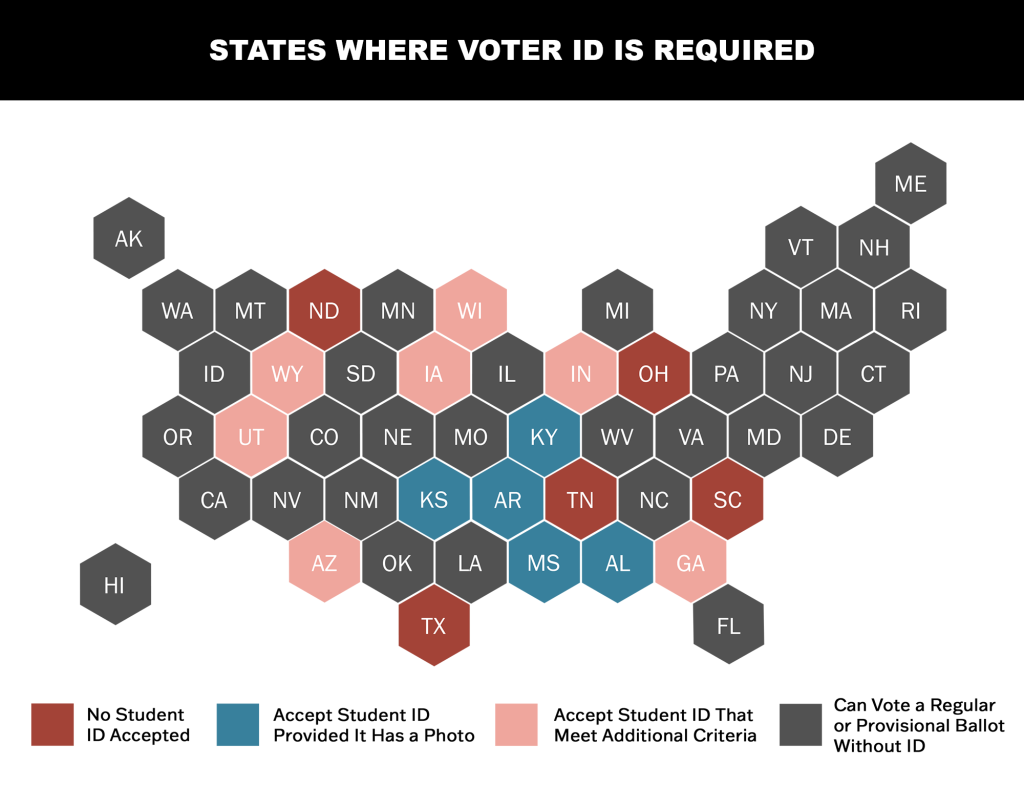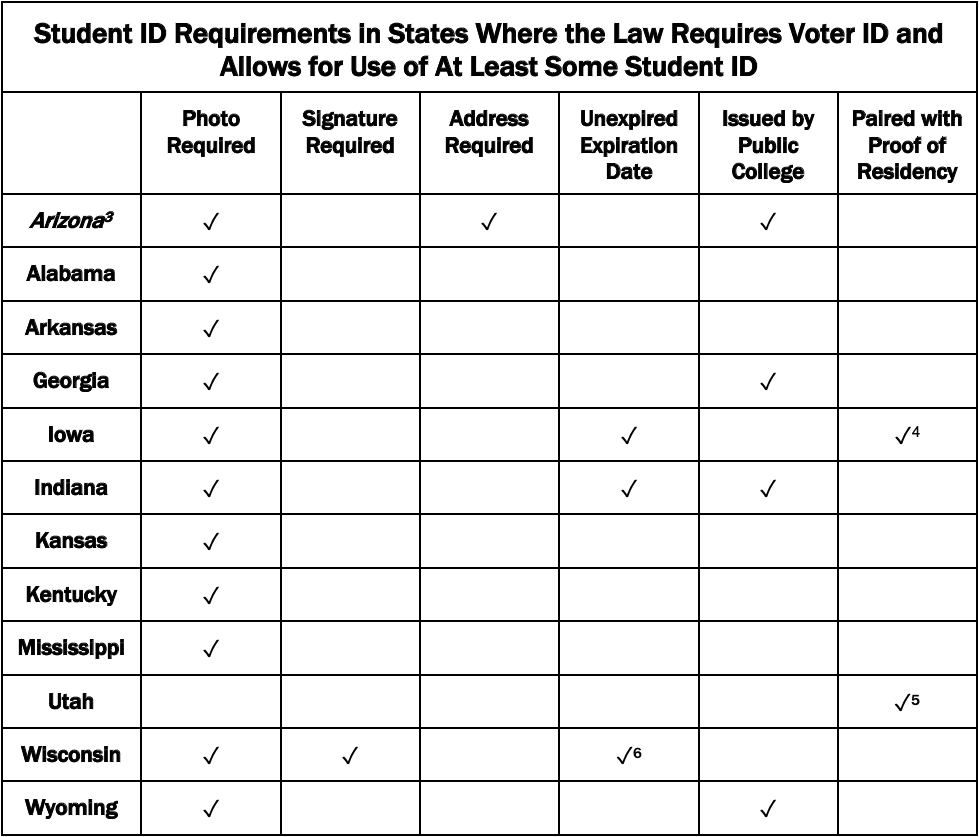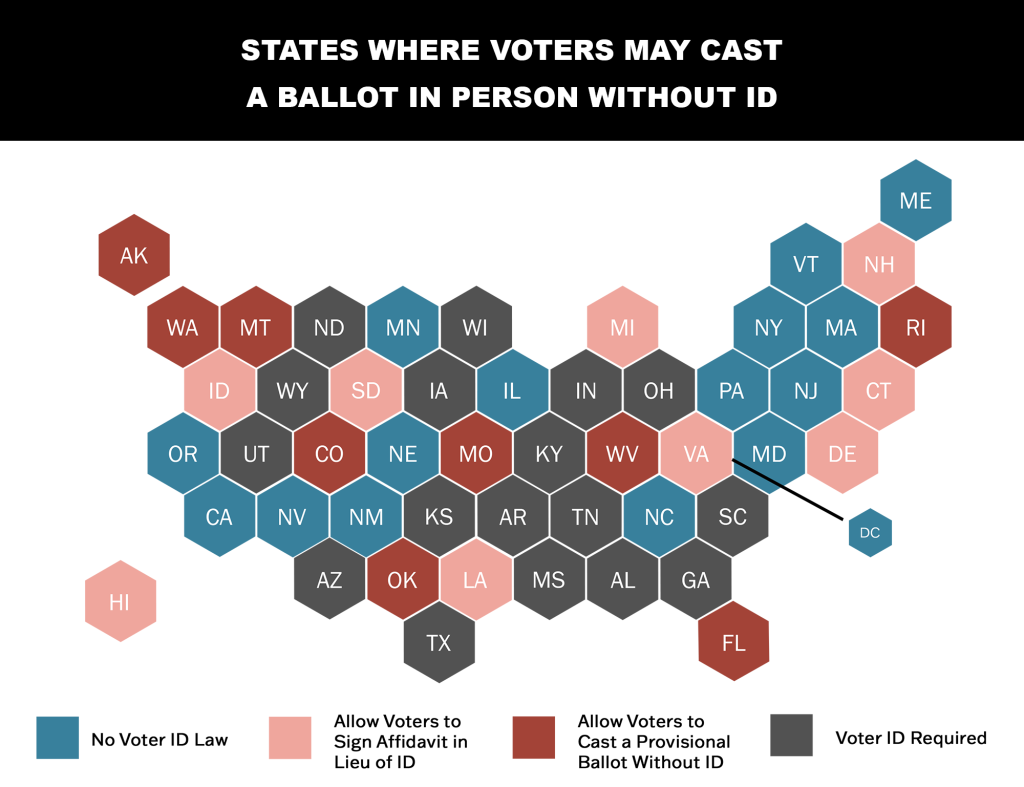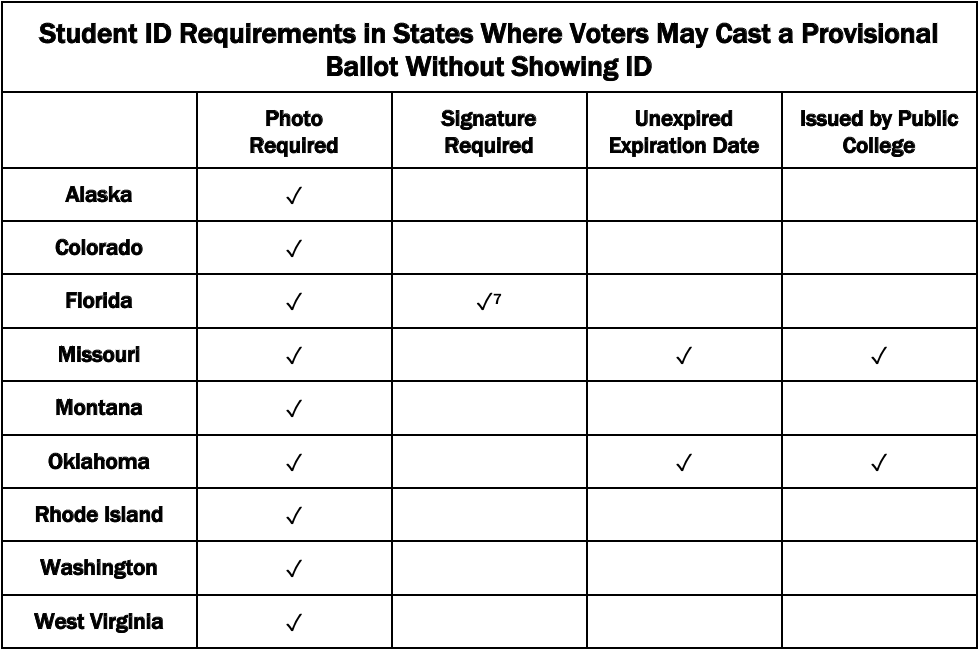Download a PDF of this fact sheet here.
Just five states [1] have laws that require voter ID to cast a ballot and expressly forbid the use of student ID cards as a form of voter ID. In a sixth state, Arizona, the law allows for student ID cards to serve as voter ID if they meet certain requirements, but no student IDs currently meet those requirements. Two other states – Iowa and Utah – require voter ID and allow student ID cards to be used to vote only if paired with proof of residency.
The law around student IDs is in flux this session. Idaho just enacted a new law prohibiting election officials from accepting student ID as a form of voter ID. Ohio did the same earlier this year. Legislation that could change the rules around student ID has been introduced or enacted in at least 15 states this year, and the North Carolina Supreme Court just reheard a case that will determine the future of its voter ID law. Here’s what you need to know about the state of student ID laws in the United States today.
THE STATE OF CURRENT STUDENT ID LAWS
States That Require Voter ID to Cast a Ballot in Person
Just five states have laws that both require voters to show ID in order to vote in person and prohibit the use of any form of student ID as a valid voter ID: North Dakota, Ohio, South Carolina, Tennessee, and Texas. There are, however, other states that require voter ID where a student ID card on its own is currently not sufficient to vote. Although Arizona law allows for student ID cards to serve as voter ID if they meet certain requirements,[2] it appears that as of March 2023, no student ID cards issued in Arizona meet the requirements laid out by state law, meaning that no student ID cards currently serve as acceptable voter ID in Arizona. Student ID cards in Iowa and Utah must be paired with proof of residency to be used as voter ID.
[1] North Dakota, Ohio, South Carolina, Tennessee, and Texas.
[2] State of Arizona Election Procedures Manual, pg. 182, fn 47. (“While identification issued by a public college or university or other public educational institution qualifies as a state or local government-issued identification, it is not sufficient for voting purposes unless it includes the voter’s photograph, name, and address as required by A.R.S. § 16-579(A)(1)(a).”)

In the 12 states where the law requires voters to show ID to cast a ballot in person and allows for at least some forms of student ID, five accept all student ID cards as long as they contain a photo. In the other seven states, the ID must meet certain additional requirements, such as being issued by a public university, including a signature or expiration date, or being paired with proof of residency (e.g., a utility bill or bank statement).

[3] While Arizona law provides that student IDs issued by a public university may be used to vote if they include a photo and address, it does not appear that any of the state’s public colleges issue student ID cards that meet this criteria.
[4] If there is no address on the ID card (which is the case for student IDs in Iowa), it must be paired with a secondary document proving address (e.g., lease, utility bill, bank statement, paycheck, etc.).
[5] A Utah student ID may only be used as voter ID if paired with other documentation that, when combined, prove name and current residence (e.g., utility bill, bank statement, birth certificate, employee ID card, etc.)
[6] Wisconsin additionally requires an issue date. If a Wisconsin student ID card is expired, it may still be used if in conjunction with a separate document that proves current enrollment, such as a tuition fee receipt, enrollment verification letter, or class schedule.
States Where Voters May Cast a Ballot in Person Without ID
The laws also vary in the 33 states where voters may cast a ballot in person without showing ID. Of these states:
- Fifteen do not have a voter ID law;
- Nine allow voters to sign an affidavit attesting to their identity in lieu of showing ID; and
- Nine allow voters without ID to cast a provisional ballot that will be counted as long as the signature (or other information) on the ballot matches that on file. All nine of these states also allow students to cast a ballot in person, using at least some forms of student ID.

In nine states, voters who do not have an ID with them may cast a provisional ballot that will be counted if the signature or other information on it matches the information on file. All nine of these states accept at least some forms of student ID for voters who choose to show ID and cast a ballot in person.

[7] If the student ID lacks a signature, the student may still use it if coupled with a second document that has their signature.
POTENTIAL CHANGES TO VOTING WITH STUDENT ID
State legislatures and courts are considering a number of changes that would impact voting with student ID this year. Here are some examples:
As of January 1, 2024, Idaho students will no longer be able to use their student ID cards to vote. Idaho just enacted H.B. 124, a bill that expressly forbids the use of student ID for voting. The remaining forms of acceptable voter ID in Idaho include permits to carry concealed weapons, driver’s licenses, state ID cards, tribal ID cards that include a photo, and passports..
North Carolina may join states that require voter ID and accept some forms of student ID. North Carolina has a voter ID statute that never took effect because it was found to be racially discriminatory and unconstitutional. However, on March 15, 2023, in a highly unusual move, a newly-configured North Carolina Supreme Court reheard the case to reconsider whether the state’s voter ID law has a discriminatory intent or impact. If the court determines that the law is not unconstitutional, the law will take effect, and voters will be required to show ID to cast a ballot in person. Student ID cards will be accepted only if they have an expiration date and photo printed on them.
At least four states with existing voter ID laws introduced or enacted legislation that would restrict or eliminate the use of student ID cards to vote in 2023. Ohio enacted a bill that prohibits the use of student ID to vote. A bill that removes student ID from the list of acceptable forms of voter ID is on the governor’s desk in Idaho. Legislation restricting the use of student IDs failed in Virginia and Wyoming.
At least four states with existing voter ID laws introduced legislation that would add or expand the use of student ID cards to vote in 2023. Legislation in Tennessee and Texas would add student ID cards to the list of acceptable forms of voter ID. Tennessee and Texas are currently two of the five states to explicitly prohibit the use of any form of student ID. Bills in Indiana and Missouri would expand the types of student ID cards that are accepted as voter ID.
Nine states with no existing voter ID laws introduced legislation in 2023 to create a voter ID requirement. None of these bills have advanced thus far in session.